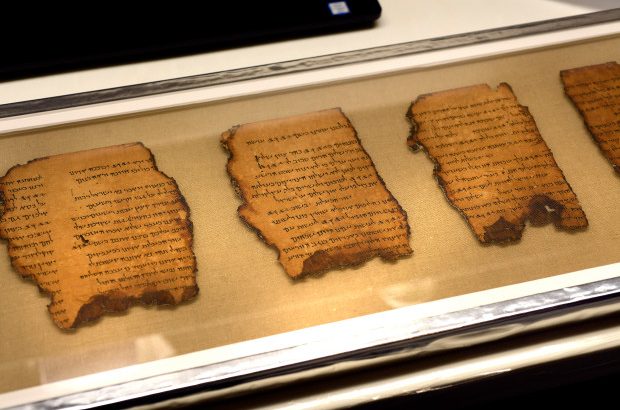The Museum of the Bible has announced that five of its most prized artefacts – valuable fragments in its collection of Dead Sea Scrolls – are forgeries that will no longer be displayed at the museum in Washington DC.
Researchers in Germany tested five of the museum’s 16 fragments, bought by the billionaire businessman and museum founder Steve Green, and determining they showed “characteristics inconsistent with ancient origin”.
The Dead Sea Scrolls were discovered by Bedouin shepherds in the Qumran Caves in the West Bank in the 1940s and revolutionised the study of the early Bible.
The scrolls, which total over 100,000 fragments, include passages from the Old Testament transcribed more than 2,000 years ago.
“Though we had hoped the testing would render different results, this is an opportunity to educate the public on the importance of verifying the authenticity of rare biblical artifacts, the elaborate testing process undertaken and our commitment to transparency,” said Dr Jeffrey Kloha, the chief curatorial officer for Museum of the Bible.
The Museum of the Bible’s opening was mired in controversy over its display of the fragments and its association with Mr Green, an evangelical Christian who is president of the arts and craft supply group Hobby Lobby.
Following a federal investigation, Hobby Lobby agreed in July of last year to forfeit over 5,500 artefacts smuggled out of Iraq.
In a statement the Museum of the Bible said it had sent the five fragments to Bundesanstalt für Materialforschung und-prüfung (Bam) for a series of advanced tests, including material analysis and X-ray exams, which compounded previous research that drew the fragment’s authenticity into question.
Collection
Researchers are continuing to examine the rest of the museum’s collection of Dead Sea Scrolls, with one academic, Dr Kipp Davis of Trinity Western University, stating he has concluded at least seven of the museum’s fragments are fake.
“My studies to date have managed to confirm upon a preponderance of different streams of evidence the high probability that at least seven fragments in the museum’s Dead Sea Scrolls collection are modern forgeries, but conclusions on the status of the remaining fragments are still forthcoming,” Davis said in a statement.


 Photo: Helen H. Richardson/The Denver Post
Photo: Helen H. Richardson/The Denver Post 